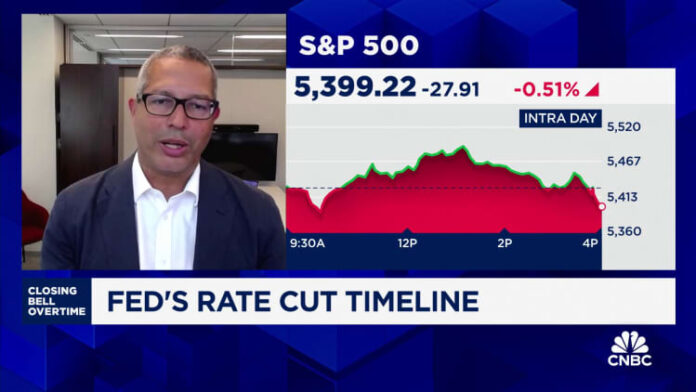Valentinrussanov | E+ | Getty Images
The Federal Reserve is expected to make its first interest rate cut in years this fall, which may lead to a decline in mortgage rates.
Even small interest rate cuts could make a significant difference in the cost to a home buyer. Up until this point, people looking to buy a home have been eagerly awaiting a rate cut from the central bank.
The Fed meets this week, but experts say it is more likely that the first rate cut will come in September. That would be the first rate cut since 2020, when the Covid-19 pandemic began.
While the chance of a rate cut at the upcoming Federal Open Market Committee meeting is less than 6 percent, according to CME's FedWatch futures market indicator, the probability of a quarter-percentage point cut in September, November and December is far greater.
This and further cuts in 2025 would, according to some experts, bring the Fed's key interest rate down to below 4% by the end of next year.
Although mortgage rates are fixed and largely tied to Treasury yields and the economy, they are also influenced in part by Fed policy. Mortgage rates have already started to fall, in part because the Fed has put off raising interest rates.
This is what homeowners and buyers need to know.
Interest rate cuts are already priced into the market
The first rate cut has already been almost fully priced in financial markets, especially bond markets, said Chen Zhao, head of economic research at Redfin, an online real estate brokerage. In other words, mortgage rates would not change significantly if the Fed actually starts cutting rates, she said.
“Many of these rate cuts are already priced in,” she said.
The interest rate on a 30-year fixed-rate mortgage fell from 7.22 percent on May 2 to 6.78 percent on July 25, according to data from Freddie Mac via the Fed.
Refinance now or later?
“Refinancing is starting to pick up. It's not a huge wave yet, but it's picking up a little bit as interest rates start to come down,” Zhao said.
According to the Mortgage Bankers Association, refinancing activity for existing home loans rose 15% from the previous week, reaching its highest level since August 2022, and was 37% higher than a year ago, according to the MBA.
Whether homeowners should refinance depends in part on their existing interest rate, says Selma Hepp, chief economist at CoreLogic.
“There are people who took out their loans when mortgages peaked at 8 percent last fall,” Hepp said. For these buyers, “there are some opportunities here.”
More from Personal Finance:
Home insurance premiums rose 21% last year
How to tell if your market is favorable for home buyers
1 million people currently owe more than $200,000 in federal student loans
To be “in the money,” or for refinancing to make sense, homeowners need to see a significant drop in mortgage rates to take advantage, experts say. The prevailing rate should be at least 50 basis points below your current rate. A basis point is one-hundredth of a percentage point.
While that can be a good strategy, it's not a “hard-and-fast rule,” says Jacob Channel, chief economist at LendingTree.
The timing of refinancing your home depends on factors such as your monthly mortgage payment and whether you can afford closing costs, he said: “There's a lot of variability.” (If you're refinancing a mortgage, you'll likely incur closing costs, as well as an appraisal and title insurance; and the total price will depend on your area.)
“The savings have to exceed your upfront costs,” Zhao explained.
Even if your current mortgage rate is high, you may want to wait until the central bank is further along with its rate cuts, with rates expected to fall steadily throughout the year and into 2025, Zhao said.
If you're thinking about it, reach out to lenders and see if refinancing makes the most sense for you now or in the near future, Channel said.
Buy now or later?
While lower interest rates may be a relief for homebuyers with limited expenses, the true impact of lower borrowing costs is still unclear, according to Zhao.
For example, if borrowing costs for home loans go down, there's a chance more buyers will come into the market. And if demand exceeds supply, prices could rise even further, she said. That could “neglect the relief you get from mortgage rates.”
However, what exactly will happen in the housing market is “uncertain” and depends on how much mortgage rates fall in the second half of the year and how high the supply is, Channel said.
“Finding the right time to enter the market is basically impossible,” Channel said. “If you keep waiting for perfect market conditions, you'll be waiting forever. Buy now only if it's a good idea for you.”
Don't miss these insights from CNBC PRO
















